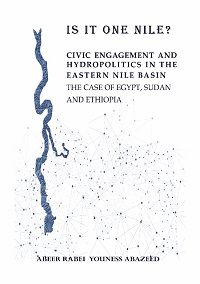PhD defence: Is It one Nile? Civic Engagement and Hydropolitics in the Eastern Nile Basin: The Case of Egypt, Sudan and Ethiopia
 Abeer Abazeed, guest PhD at the ASCL, will defend her dissertation, Is It one Nile? Civic Engagement and Hydropolitics in the Eastern Nile Basin: The Case of Egypt, Sudan and Ethiopia, on 21 April at 3 pm. The ceremony will be livestreamed.
Abeer Abazeed, guest PhD at the ASCL, will defend her dissertation, Is It one Nile? Civic Engagement and Hydropolitics in the Eastern Nile Basin: The Case of Egypt, Sudan and Ethiopia, on 21 April at 3 pm. The ceremony will be livestreamed.
Abstract
This dissertation argues that civil society actors have engaged in Eastern Nile politics despite the dominance of states and intergovernmental organisations. There are different characteristics of civil engagement in Nile politics. There are structured organisations including non-governmental organisations and think tanks, others act through initiatives and loosely structured arrangements such as diaspora groups and youth-based initiatives. The analysis of this dissertation focuses on transnational activities of civil society actors in the Eastern Nile Basin countries: Egypt, Sudan and Ethiopia. It investigates how an intergovernmental organisation (the Nile Basin Initiative) interacts with different civil society actors (e.g. the Nile Basin Discourse). Network analysis has been applied to understand interconnections among civil society actors on the one hand and relations with national governments and donor agencies on the other hand. Several interviews have been conducted in Egypt, Sudan and Ethiopia with a variety of actors to discern their positions on the issues and connections with other actors. The research findings show a clustered network as civil society actors operating in small groups rather than covering the whole Eastern Nile Basin. The network has this feature because the majority of organised civil society actors employ depoliticized activities, such as capacity building programs, water service provision and awareness raising. Nevertheless, unstructured civil society activism (e.g. diaspora groups and anti-dam movements) has been able to contest water policies and projects as determined on national levels. The research shows civil society actors often take similar positions as their respective governments regarding contested politics (e.g. water shares), despite the fact that they may conduct joint activities with other civil society actors in transnational networks across the Eastern Nile Basin. But enhanced patterns of civil society engagement and transnational patterns of collaboration could constitute a counterweight to nationally determined agendas that often lead to clashing visions on water governance in the region and among the riparian communities.
Promotors: Prof. dr. Madeleine O. Hosli and Prof. dr. Mohamed. A. R. M. Salih

